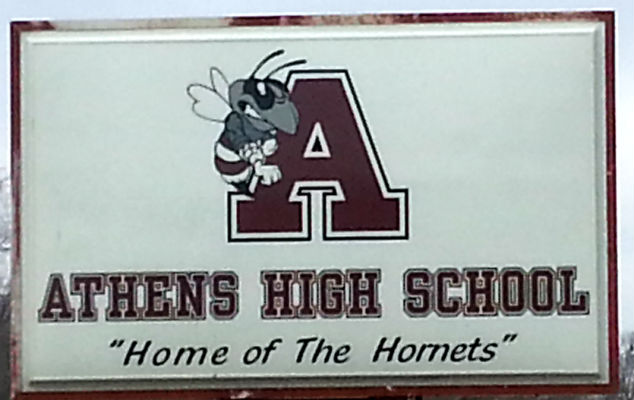 (This is Part 2 of 2 describing the College for All and Early College programs at Athens High School. Part 1 provided background about the programs and discussed funding and the importance of the Murchison Foundation.)
(This is Part 2 of 2 describing the College for All and Early College programs at Athens High School. Part 1 provided background about the programs and discussed funding and the importance of the Murchison Foundation.)

ATHENS — Aristotle once wrote that “the whole is greater than the sum of its parts.”
Aristotle may be a little heavy for a Friday afternoon in Athens, but the phrase fits when talking about what’s going on out at Athens High School.
The Early College High School is pretty neat. The Career Technology Education (CTE) program is cool. The new College for All program is starting to turn heads.
But the idea behind it all is a downright game changer.
“I want the choice to be the students’. If that’s what they want to do and they want to go to culinary arts school, then we’re going to find a way to do that for them. If they want to go to college and do something different, then we are going to find a way to do that for them,” AHS Principal Jami Ivey told Henderson County Now this week. “Everything is not cookie-cutter anymore, it’s just not.”
Ivey isn’t the only one behind these programs, and she’s the first one to tell you that. Early College is now in its fifth year and CTE its third, and neither would be here today without the support of superintendents, school board members, the community, and lots of teachers.
But she was the face of the Early College program and now that she is principal of the entire high school campus, she’s brought with her that drive to see her students advance.
She may not be the one behind the whole shift, but she does give it a voice.
“There are so many barriers for our kids because of our economically disadvantaged group,” she said. “I want to remove whatever barrier out there I can so the choice is the student’s and not some adult’s about whether they can go to college or not.”
“It is not just about going to TVCC, but about changing the culture,” she said.
SHIFTING PARADIGMS
The goal is to make sure AHS students are ready for a career or college when they graduate, and sometimes that isn’t as easy as it sounds.
“A lot of our kids here have never been told that they could do something; they’ve always been told why they can’t, from the beginning up,” Ivey said.
Ivey is familiar with being told she can’t do something.
“We were told all the way through why we can’t and we had to do it in spite of that, that’s what happened (at Early College),” she said, “and that’s what it is going to take over here.”
“It is a blessing that I was over at the Early College for almost five years and then to come here, because I can see where we are headed and where we can change some things to get it there,” she said.
One of the changes includes a longer day. Teachers have been signing up at the high school to stay around until 6:30 p.m. so that students have someone to turn to for help with college-level work.
“That’s been ingrained at the Early College for five years. I’m trying to get it ingrained where we’re starting it over here,” Ivey said.
The change also makes sense from a strategic sense. Ivey said the high school had 901 students as of last week.
“We have 85 on the working staff and three administrators,” Ivey said. “If we don’t find a way to split that (901) out into small learning communities, small schools within schools and small teams academically where we can keep track of kids, they are going to get lost.”
And with educators struggling to understand vague guidelines from the state on the new STAAR test, and some students still under the old TAKS test, a lost kid is one who is in danger of failing.
STRUGGLES AND SUCCESS
Don’t think all these changes have come without some bumps in the road. The Early College, in particular, has faced some criticism about who was allowed into the program.
According to the Texas Education Agency, only students who fit criteria as being at-risk, economically disadvantaged, or a first (or in some cases, second) generation college student are eligible to participate in the Early College program.
The decision on who fits the criteria has been questioned at times by members of the community.
Ivey has two answers:
1. The community doesn’t always know all the details.
“As a school we know some information about certain families that others may not know. And we can’t share that,” she said.
Because of that, the school district does have a little leeway on who is allowed into the program.
2. The way the criteria is applied has changed over the years.
Ivey points out that Athens ISD is now on its third superintendent since the Early College program was initiated.
“There have been different leaders of the district with different visions, so there have been different blends at the Early College in different years,” she said, and she admits that can be confusing.
But the bottom line is the program continues to grow and improve.
“Last year, we took 100 kids and all 100 met the criteria of being at-risk, economically disadvantaged, or first generation,” Ivey said. “We can’t do anything about what’s happened in the past, or the decisions that were made, but we can move forward.”
And moving forward includes bringing many of those ideas to the main campus for the students who don’t qualify for Early College.
“That’s the reason we have stretched and looked for an alternative, an option for our parents and students who cannot qualify ever to get into Early College, but who have a desire and have a need,” Director of Curriculum Dr. Janie Sims said. “Middle class families, working families, it helps them if their child can go to college. And that’s the reason for College for All.”
The successes have made the struggles worthwhile.
Consider 2012 AHS graduate Carlos Tovias. He was also a 2012 TVCC graduate (like 83 percent of his Early College classmates).
He also earned a national Jack Kent Cooke Foundation scholarship and is now continuing his education at the Cockrell School of Engineering at University of Texas in Austin.
He’s not the only one moving forward.
“Those (Early College) students are at A&M, they are UNT, they are all over,” Ivey said. “And it is important for this group to see that and say, ‘OK, it can be done if we don’t have the barriers.’ Where we can level out the playing field for the main campus, because these kids are in just as much need.”
“I know when you put them in certain situations, our kids kids can do it. It is just putting them there and getting them to believe that they can.”
